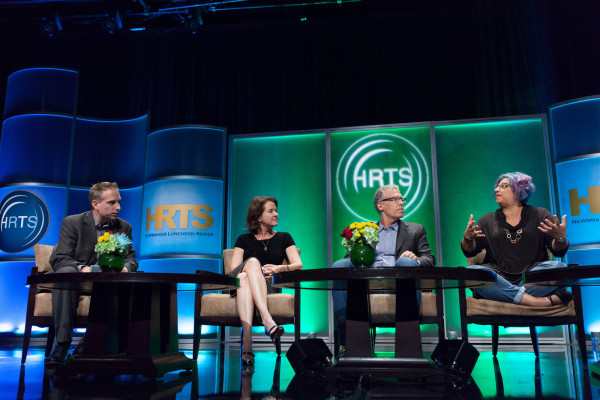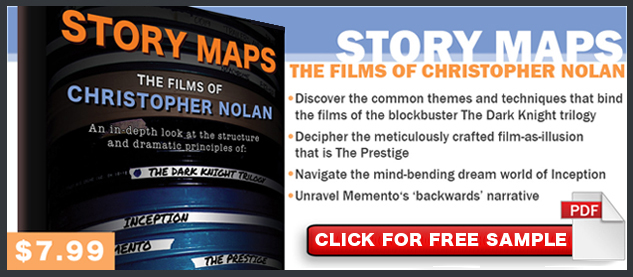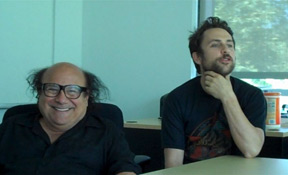Orange is the New Black, Bates Motel and Masters of Sex creators talk TV writing and producing at HRTS Hitmakers Luncheon
I felt like Don Draper strolling into the iconic, tres-swanky Beverly Hilton to attend the HRTS (Hollywood Radio and Television Society) “Hitmakers Luncheon.” When I was politely informed that I was not on the list for the pre-lunch VIP reception, I felt like Dan Calvisi again. (You always have to try to sneak into the VIP section, people, it keeps them on their toes.) But the event began soon enough, and after a delicious lunch, I enjoyed listening to the panel of three of the most successful American TV producers working today, as they discussed their craft and business.
The panel consisted of Michelle Ashford ( creator and Executive Producer of “Masters of Sex” on Showtime), Carlton Cuse (co-creator, showrunner and E.P. of “Bates Motel” on A&E) and Jenji Kohan (creator and E.P. of “Orange is the New Black” on Netflix). Their past writing credits include John Adams, Boomtown, Lost, Nash Bridges, Weeds and Gilmore Girls.
On basing characters on real-life people and developing from source material…
Michelle Ashford “Masters of Sex” (M.A.): She always tries to be beholden to her subjects (Masters and Johnson), to stay true to their lives and experiences, and makes sure they “never fudge the science.” Their only source material as far as story has been the exhaustive biography written about Masters and Johnson by Thomas Maier. It is a long book but it also has gaps to fill, thus allowing for her writers to expand on the story in fictional ways that could last for several seasons.
Jenji Kohan “Orange is the New Black” (J.K.): They deviated very early on from the original book because they had the rights to Piper Kerman‘s life but not the other inmates. They also changed a lot about Piper in creating the fictional version of her for the show. “Our Piper and the real Piper are very different people.” Jenji emails with Piper on occasion, but mostly just for technical questions, such as details about prison life. Piper is also very active in causes for inmate rights so she often keeps them abreast of her charity work.
Carlton Cuse “Bates Motel” (C.C.): Everyone knows the iconic Hitchcock film Psycho, so they had to find a fresh, character-based approach for a TV show. Cuse chose to keep the hotel and the house and “make up the rest.” The one character that was not developed in the movie was Norman’s mother, Norma Bates, so Cuse decided to focus on her and her relationship with her son. The initial question was, What if the mother of this monster was actually a loving, caring woman, but somehow tragically enabled her son’s violent nature? The concept of the show became a “contemporary prequel” since Cuse found it more interesting to set it in modern day. He calls it, “A timeless relationship colliding in a coastal Oregon town.” As far as tone, he wanted to make a funny, heartfelt show, not just a “dark” show.
On relevance and nudity…
M.A.: They knew that “Masters of Sex” would only work if it was relevant to today, so they made sure the underlying issues were contemporary. This was not difficult, considering that the same dilemmas about sex and relationships exist today as they did in the Fifties and Sixties! Sex can too often be used in a cliche manner in film and TV, so they make sure to only show sex that is deeply related to story. They want it to be unique, fun, funny, strange, truthful, whatever, as long as it’s not predictable and cliche.
J.K.: Jenji noted that they use a lot of nude extras in the backgrounds of scenes, and she applauds them, considering they only make ten more dollars per day to be nude! The toughest part about sex scenes and nudity for Jenji is to convince the actors to be comfortable with it, and to get others to recognize that “nudity is not necessarily sexuality.” As far as guidelines for nudity, Netflix does not impose limits. In season two, they will have some male frontal nudity and they never got any notes from Netflix.
On the Emmys and prestige of a good show…
J.K.: She’d like to see the Emmys embrace a Half Hour and a One Hour category, rather than Drama and Comedy, which make for a lot of confusion when you have shows that embrace both, like “Enlightened.” They must adapt to the times. “Drama must have comedy or it is not reflecting reality.”
C.C. A big shift that he’s seen in recent years is that some shows are now made only for quality, not just ratings. Some networks want a show that delivers high quality content so it gives them a sense of prestige or artistic cache.
On casting…
M.A.: There are just not enough good roles in film for serious actors, so they are coming to TV. Especially women.
J.K.: They cast Orange out of New York, which she says gave them a lot of fresh faces to choose from, and the resulting cast was “an embarrassment of riches.”
C.C.: When it comes to casting actors, “the winner takes it.” In other words, the influx of overseas actors to American productions has to do with who is the best actor in the room, not a trend.
On shooting outside Los Angeles…
J.K.: Runaway production breaks her heart. California is making a huge mistake by not offering tax incentives to productions, and losing so many jobs. She wanted to shoot Orange in the same studio in L.A. with the same crew as “Weeds,” but “you just can’t beat a 35% below the line tax break.”
On pilot season versus going straight to series…
J.K.: The pilot process is so wasteful. It was awesome to go straight to series. If they believe in a show, they should just buy it.
C.C.: Pilot process is flawed because making a pilot is not directly connected to series longevity. They are completely different animals, so the idea that by making a pilot the network knows better what they are buying is not accurate.
On using Twitter and Social Media…
C.C.: He is the only one on the panel with a Twitter account [@carltoncuse]. When asked about the Twitterverse and “Lost,” he actually doesn’t talk much about the show on Twitter and says that most people have expressed positive reaction to him in regards to the controversial “Lost” finale.
MA.: “Social Media feels like noise. It’s hard enough to keep your head down, do the work, and put out a great show.” Tweeting is just “beside the point,” it’s not the work. But, with that said, it is a part of the process now so she’s grateful that Sony has a team in place to handle the social media side and they are experts at it.
J.K.: “It’s too much, I have work to do. And I feel that it contributes to the culture of giving your work away for free. Everyone on the internet thinks that everything should be free.”
On viewing habits…
J.K.: For the first season they didn’t think about viewing habits, but for the second season they have. She realized that she could ‘save’ characters, take them out of the story for an hour, because viewers can binge-watch a bunch of episodes in a row on Netflix. So they don’t have to wait a week to see their favorite character again like on traditional TV, they just have to wait an hour. But she misses the water cooler effect of talking about a show the morning after it aired. A friend told her to think of her Netflix series more like a book, where you put it out there and people discover it at different times, and it’s always around for fans to re-visit.
M.A.: Doesn’t binge-watch, she likes the weekly ritual of ‘live’ viewing. Does not have time for a 13-hour viewing marathon.
What’s next?
C.C.: His upcoming show is “The Strain” on FX, an adaptation of the supernatural book trilogy written by Guillermo Del Toro and Chuck Hogan. Cuse liked that it upended the vampire genre, avoiding all of the cliches of films like Twilight or shows like “The Vampire Diaries.”
M.A.: Her goal with “Masters of Sex” is to make each season very different from the one before. With so much life history of Masters and Johnson to draw from, she knew early on that this would be possible, and could hold the audience’s interest for a long run.
J.K.: She is responding to the audience’s “favorites,” thus Season Two of “Orange is the New Black” will consist entirely of “dance parties, pie throwing and urination!”
Thank you to the HRTS and the panelists for a great event. If you need me, I’ll be hanging by the pool at the Beverly Hilton.
Good luck and happy writing,
Dan
Related: TV Pilot Consultation
Related: More TV interviews
Related: More on TV Writing
 “Dan has a no-nonsense approach to screenplay analysis that cuts through the bull and delivers the goods. A must read for serious screenwriters.”
“Dan has a no-nonsense approach to screenplay analysis that cuts through the bull and delivers the goods. A must read for serious screenwriters.”
-J. Stephen Maunder, Writer/Director
“…as much as an analysis of Nolan the filmmaker as it is an analysis of story structure within his films.”
-Script Magazine





Leave a Reply
Want to join the discussion?Feel free to contribute!